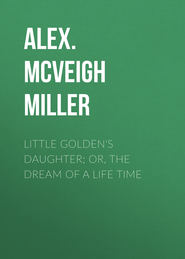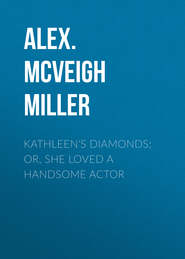По всем вопросам обращайтесь на: info@litportal.ru
(©) 2003-2024.
✖
Pretty Geraldine, the New York Salesgirl; or, Wedded to Her Choice
Настройки чтения
Размер шрифта
Высота строк
Поля
CHAPTER XXVI.
TOO LATE! TOO LATE
"'What is life?'
A battle, child,
Where the strongest lance may fail,
Where the weariest eye may be beguiled,
And the stoutest heart may quail,
Where foes are gathered on every hand,
And rest not day or night
But the angels of heaven are on thy side,
And God is over all."
When Robert returned from the engine-house, he was in doubt whether he ought to follow Hawthorne or not.
"If he has gone to Miss Harding's house, everything must be all right between them. It must be some other lady in the same house that Standish is going to take away. It's a lodging-house, and he may be acquainted with a dozen ladies there, for all I know."
But still, in spite of these thoughts, he kept on driving to the house.
"I'll go past it anyway, and see if the fellow is there yet with his grand sleigh."
He threw himself back with an air of importance, for he was certainly enjoying his little outing. The road was gay with vehicles, and the air musical with the ring of sleigh-bells. New York was enjoying its Christmas.
Almost before he realized it, he found himself on the obscure street, and in front of the shabby house where Geraldine lived, a pure pearl in an uncouth setting.
He reined up in front of the house and cogitated:
"The sleigh isn't here. Mr. Standish must have got his girl and gone. Maybe I ought to go, too. I don't see that I have any business going in!"
Smiling to himself at his humorous play on the verb to go, he waited a minute, glancing curiously at the front of the four-story house that looked dark and still as though most of the people had gone out or retired.
He pictured to himself the handsome fireman within that tenement, sitting by the side of his sweet young love, Geraldine, perhaps holding her dainty hand and looking love into eyes that answered love again.
"No, I mustn't go in. I might interrupt a charming tete-a-tete," he decided, and was about to turn back to the livery stable, when the door before him opened suddenly, and a man appeared, reeling down the steps like one under the influence of liquor or some heart-breaking emotion.
Robert stared at the handsome figure a moment, then called, questioningly:
"Mr. Hawthorne?"
Hawthorne stopped, looked up, and asked, hoarsely:
"Who is that? Oh, Robert, is it you? What are you doing here?"
"I came to see you, Mr. Hawthorne."
"What can I do for you? Speak quickly, for I'm going—oh, God! where—for I know not where to turn!"
The words were a cry of agony, and as he came up to the side of the sleigh, the youth saw that his face was deathly pale, as if from terrible trouble.
His first fear that Hawthorne was intoxicated gave way to the conviction that something was wrong about Geraldine, and he said, quickly:
"You're in trouble, sir, and I think I can help you if you'll tell me all about it. Get in the sleigh, won't you, and let me drive you wherever you want to go."
"Thank you, Robert. I came on a car, and this is very welcome," said Hawthorne, getting in by the youth's side.
"Where to?" asked Robert, taking up the reins.
"Where? Oh, God, where!" groaned Hawthorne, despairingly. "Wait," he added, laying his hand on the boy's shoulder. "Ah, Robert, this is one of the darkest hours of a life that has had many shadows. I came here to see my betrothed bride, my heart full of joy that has turned to keenest pain, for I found her gone from me—lured away by a scheming villain that she hates—and what her terrible fate may be, God only knows, for I have not a single clew to follow."
"Oh, yes, you have—a clew to follow the villain himself. You mean Standish, don't you?" shouted Robert, wildly, in his excitement.
"Yes, he has lured her away by a cunning trick—" began Hawthorne again, but the youth interrupted:
"Yes, yes, I know; he has taken her to the Cortlandt street ferry—going to elope with her, I reckon. But we'll follow and outwit the villain," and chirping to his horse, Robert drove to the ferry as fast as he dared.
On the way he told Hawthorne all that he knew, and received his confidence in turn.
So the actor's plot was laid bare. No doubt existed as to his intentions to abduct Geraldine.
On their way, just half a block from the ferry, Robert exclaimed:
"There's our sleigh going back now to the stables. Hello, Pete!"
The driver drew rein, and he asked, anxiously:
"Where's the lady and gentleman you took down to the ferry?"
And the answer was like the trump of doom to Hawthorne's sore heart.
"The lady and gentleman, sir? Oh, they took the Pennsylvania Limited train to Chicago."
"Are you sure?" cried Robert.
"Oh, yes; I crossed the river with them, and saw them board the train. That is, the man carried her in his arms. She got sick, or fainted, maybe, just beforehand, and he grabbed her up and climbed on with her just as the whistle blew. Oh, they're off, for sure. Is anything wrong?" added the driver, curiously, scenting an elopement.
CHAPTER XXVII.
HAWTHORNE CLUNG TO HOPE, IN SPITE OF HIS TROUBLE
"Has Fate o'erwhelmed thee with some sudden blow?
Let thy tears flow.
But know when storms are past the heavens appear
More pure, more clear;
And hope, when farthest from their shining rays,
For brighter days!"
The curious sleigh-driver got no answer to his question.
Robert touched up his horse, and it bounded toward the ferry.
TOO LATE! TOO LATE
"'What is life?'
A battle, child,
Where the strongest lance may fail,
Where the weariest eye may be beguiled,
And the stoutest heart may quail,
Where foes are gathered on every hand,
And rest not day or night
But the angels of heaven are on thy side,
And God is over all."
When Robert returned from the engine-house, he was in doubt whether he ought to follow Hawthorne or not.
"If he has gone to Miss Harding's house, everything must be all right between them. It must be some other lady in the same house that Standish is going to take away. It's a lodging-house, and he may be acquainted with a dozen ladies there, for all I know."
But still, in spite of these thoughts, he kept on driving to the house.
"I'll go past it anyway, and see if the fellow is there yet with his grand sleigh."
He threw himself back with an air of importance, for he was certainly enjoying his little outing. The road was gay with vehicles, and the air musical with the ring of sleigh-bells. New York was enjoying its Christmas.
Almost before he realized it, he found himself on the obscure street, and in front of the shabby house where Geraldine lived, a pure pearl in an uncouth setting.
He reined up in front of the house and cogitated:
"The sleigh isn't here. Mr. Standish must have got his girl and gone. Maybe I ought to go, too. I don't see that I have any business going in!"
Smiling to himself at his humorous play on the verb to go, he waited a minute, glancing curiously at the front of the four-story house that looked dark and still as though most of the people had gone out or retired.
He pictured to himself the handsome fireman within that tenement, sitting by the side of his sweet young love, Geraldine, perhaps holding her dainty hand and looking love into eyes that answered love again.
"No, I mustn't go in. I might interrupt a charming tete-a-tete," he decided, and was about to turn back to the livery stable, when the door before him opened suddenly, and a man appeared, reeling down the steps like one under the influence of liquor or some heart-breaking emotion.
Robert stared at the handsome figure a moment, then called, questioningly:
"Mr. Hawthorne?"
Hawthorne stopped, looked up, and asked, hoarsely:
"Who is that? Oh, Robert, is it you? What are you doing here?"
"I came to see you, Mr. Hawthorne."
"What can I do for you? Speak quickly, for I'm going—oh, God! where—for I know not where to turn!"
The words were a cry of agony, and as he came up to the side of the sleigh, the youth saw that his face was deathly pale, as if from terrible trouble.
His first fear that Hawthorne was intoxicated gave way to the conviction that something was wrong about Geraldine, and he said, quickly:
"You're in trouble, sir, and I think I can help you if you'll tell me all about it. Get in the sleigh, won't you, and let me drive you wherever you want to go."
"Thank you, Robert. I came on a car, and this is very welcome," said Hawthorne, getting in by the youth's side.
"Where to?" asked Robert, taking up the reins.
"Where? Oh, God, where!" groaned Hawthorne, despairingly. "Wait," he added, laying his hand on the boy's shoulder. "Ah, Robert, this is one of the darkest hours of a life that has had many shadows. I came here to see my betrothed bride, my heart full of joy that has turned to keenest pain, for I found her gone from me—lured away by a scheming villain that she hates—and what her terrible fate may be, God only knows, for I have not a single clew to follow."
"Oh, yes, you have—a clew to follow the villain himself. You mean Standish, don't you?" shouted Robert, wildly, in his excitement.
"Yes, he has lured her away by a cunning trick—" began Hawthorne again, but the youth interrupted:
"Yes, yes, I know; he has taken her to the Cortlandt street ferry—going to elope with her, I reckon. But we'll follow and outwit the villain," and chirping to his horse, Robert drove to the ferry as fast as he dared.
On the way he told Hawthorne all that he knew, and received his confidence in turn.
So the actor's plot was laid bare. No doubt existed as to his intentions to abduct Geraldine.
On their way, just half a block from the ferry, Robert exclaimed:
"There's our sleigh going back now to the stables. Hello, Pete!"
The driver drew rein, and he asked, anxiously:
"Where's the lady and gentleman you took down to the ferry?"
And the answer was like the trump of doom to Hawthorne's sore heart.
"The lady and gentleman, sir? Oh, they took the Pennsylvania Limited train to Chicago."
"Are you sure?" cried Robert.
"Oh, yes; I crossed the river with them, and saw them board the train. That is, the man carried her in his arms. She got sick, or fainted, maybe, just beforehand, and he grabbed her up and climbed on with her just as the whistle blew. Oh, they're off, for sure. Is anything wrong?" added the driver, curiously, scenting an elopement.
CHAPTER XXVII.
HAWTHORNE CLUNG TO HOPE, IN SPITE OF HIS TROUBLE
"Has Fate o'erwhelmed thee with some sudden blow?
Let thy tears flow.
But know when storms are past the heavens appear
More pure, more clear;
And hope, when farthest from their shining rays,
For brighter days!"
The curious sleigh-driver got no answer to his question.
Robert touched up his horse, and it bounded toward the ferry.











